
Jean Marie Lucien Pierre Anouilh was a French dramatist and screenwriter whose career spanned five decades. Though his work ranged from high drama to absurdist farce, Anouilh is best known for his 1944 play Antigone, an adaptation of Sophocles' classical drama, that was seen as an attack on Marshal Pétain's Vichy government. His plays are less experimental than those of his contemporaries, having clearly organized plot and eloquent dialogue. One of France's most prolific writers after World War II, much of Anouilh's work deals with themes of maintaining integrity in a world of moral compromise.

Françoise d'Eaubonne was a French author, labour rights activist, environmentalist, and feminist. Her 1974 book, Le Féminisme ou la Mort, introduced the term ecofeminism. She co-founded the Front homosexuel d'action révolutionnaire, a homosexual revolutionary alliance in Paris.
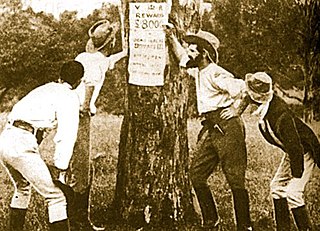
The year 1906 in film involved some significant events.

Abel Gance was a French film director, producer, writer and actor. A pioneer in the theory and practice of montage, he is best known for three major silent films: J'accuse (1919), La Roue (1923), and Napoléon (1927).

Paul Grimault was one of the most important French animators. He made many traditionally animated films that were delicate in style, satirical, and lyrical in nature.
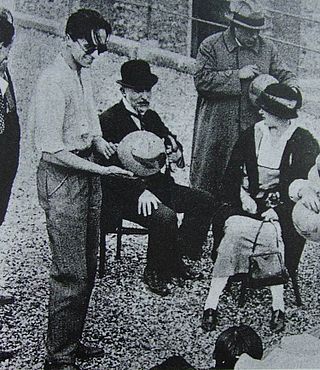
René Clair, born René-Lucien Chomette, was a French filmmaker and writer. He first established his reputation in the 1920s as a director of silent films in which comedy was often mingled with fantasy. He went on to make some of the most innovative early sound films in France, before going abroad to work in the UK and USA for more than a decade. Returning to France after World War II, he continued to make films that were characterised by their elegance and wit, often presenting a nostalgic view of French life in earlier years. He was elected to the Académie Française in 1960. Clair's best known films include Un chapeau de paille d'Italie, Sous les toits de Paris, Le Million (1931), À nous la liberté (1931), I Married a Witch (1942), and And Then There Were None (1945).
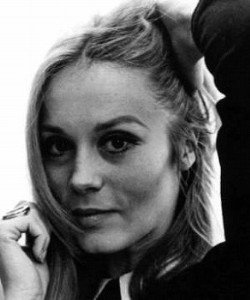
Françoise Paulette Louise Dorléac was a French actress. She was the elder sister of Catherine Deneuve, with whom she starred in the 1967 musical, The Young Girls of Rochefort. Her other films include Philippe de Broca's movie That Man from Rio, François Truffaut's The Soft Skin, Roman Polanski's Cul-de-sac, and Val Guest's Where the Spies Are.

Marcel Albert Carné was a French film director. A key figure in the poetic realism movement, Carné's best known films include Port of Shadows (1938), Le Jour Se Lève (1939), Les Visiteurs du Soir (1942) and Children of Paradise (1945); the latter has been cited as one of the great films of all time.
Jean Delannoy was a French actor, film editor, screenwriter and film director.

Adolphe d'Ennery was a French playwright and novelist.

Alexandre Astruc was a French film critic and film director.

Germaine Dulac was a French filmmaker, film theorist, journalist and critic. She was born in Amiens and moved to Paris in early childhood. A few years after her marriage she embarked on a journalistic career in a feminist magazine, and later became interested in film. With the help of her husband and friend she founded a film company and directed a few commercial works before slowly moving into Impressionist and Surrealist territory. She is best known today for her Impressionist film, La Souriante Madame Beudet, and her Surrealist experiment, La Coquille et le Clergyman. Her career as filmmaker suffered after the introduction of sound film and she spent the last decade of her life working on newsreels for Pathé and Gaumont.

Jacques Becker was a French film director and screenwriter. His films, made during the 1940s and 1950s, encompassed a wide variety of genres, and they were admired by some of the filmmakers who led the French New Wave movement.

Pierre Brasseur, born Pierre-Albert Espinasse, was a French actor.

André Cayatte was a French filmmaker, writer and lawyer, who became known for his films centering on themes of crime, justice, and moral responsibility.
Louis Jacques Marie Collin du Bocage, better known by the pen name Louis Verneuil, was a French playwright, screenwriter, and actor.
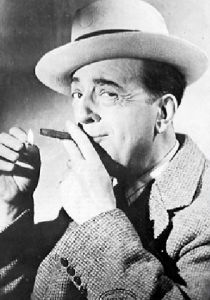
Lucien Callamand born Lucien Marie Pascal Eugène Callamand was one of the earliest French film actors whose career spanned six decades of French cinema. Between 1909 and 1965, he starred in at least 115 films.

Gilbert Prouteau was a French poet and film director. He was born in Nesmy, Vendée. In 1948 he won a bronze medal in the art competitions of the Olympic Games for his "Rythme du Stade". At the beginning of the 1990s he was, with Jean-Pierre Thiollet, one of the writers contributing to the French magazine L'Amateur d'Art.
Moustapha Alassane was a Nigerien filmmaker.
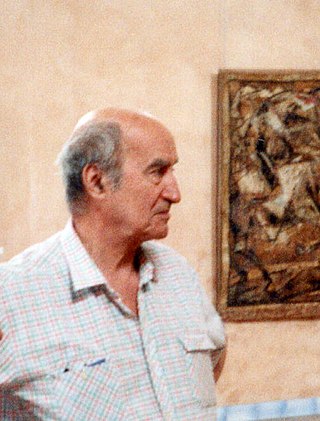
Camille Bourniquel was a French poet, novelist and painter.